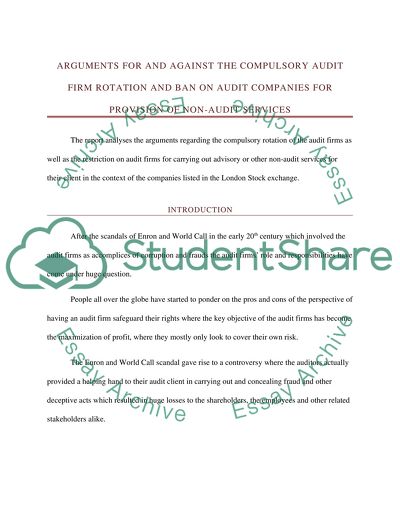Cite this document
(“Discuss the arguments for and against compulsory audit firm rotation Essay”, n.d.)
Discuss the arguments for and against compulsory audit firm rotation Essay. Retrieved from https://studentshare.org/finance-accounting/1583152-discuss-the-arguments-for-and-against-compulsory-audit-firm-rotation-and-also-for-and-against-a-total-ban-on-audit-companiesby-which-is-meant-firms-of-accountants-carrying-out-non-audit-services
Discuss the arguments for and against compulsory audit firm rotation Essay. Retrieved from https://studentshare.org/finance-accounting/1583152-discuss-the-arguments-for-and-against-compulsory-audit-firm-rotation-and-also-for-and-against-a-total-ban-on-audit-companiesby-which-is-meant-firms-of-accountants-carrying-out-non-audit-services
(Discuss the Arguments for and Against Compulsory Audit Firm Rotation Essay)
Discuss the Arguments for and Against Compulsory Audit Firm Rotation Essay. https://studentshare.org/finance-accounting/1583152-discuss-the-arguments-for-and-against-compulsory-audit-firm-rotation-and-also-for-and-against-a-total-ban-on-audit-companiesby-which-is-meant-firms-of-accountants-carrying-out-non-audit-services.
Discuss the Arguments for and Against Compulsory Audit Firm Rotation Essay. https://studentshare.org/finance-accounting/1583152-discuss-the-arguments-for-and-against-compulsory-audit-firm-rotation-and-also-for-and-against-a-total-ban-on-audit-companiesby-which-is-meant-firms-of-accountants-carrying-out-non-audit-services.
“Discuss the Arguments for and Against Compulsory Audit Firm Rotation Essay”, n.d. https://studentshare.org/finance-accounting/1583152-discuss-the-arguments-for-and-against-compulsory-audit-firm-rotation-and-also-for-and-against-a-total-ban-on-audit-companiesby-which-is-meant-firms-of-accountants-carrying-out-non-audit-services.


